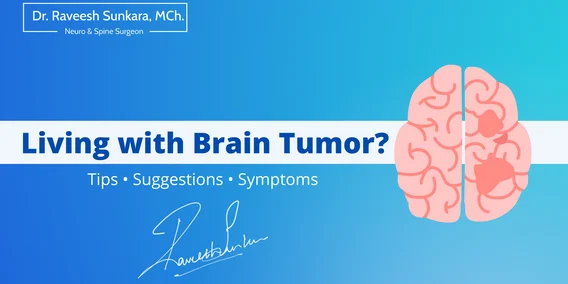Receiving the news of having cancer can be an incredibly challenging experience, completely upending your life. Discovering that you have a tumor in your brain can be particularly devastating. However, you must understand that you are not facing an immediate threat to your life. Brain tumors can be malignant (cancerous) or benign (non-cancerous). While a slow-growing tumor may eventually shorten your lifespan, it also provides an opportunity to embrace a new perspective and make the most of the time you have.
“By nurturing your mental and physical well-being, you can empower yourself and make this journey more meaningful,” says Dr. Raveesh Sunkara, a famous neurosurgeon in Hyderabad. “Remember, you are not alone; there is a supportive community ready to accompany you every step of the way.”
Today, we will explore various strategies to overcome the challenges associated with brain cancer and enhance your overall quality of life.
Can People Survive With Brain Tumor?
Yes, it is possible for people to survive with a brain tumor. The prognosis and result rely on several variables, including the type of tumor, its site, size, grade, and personal health issues. These variables can have a significant impact on survival rates and long-term results. While some brain tumors can be effectively managed and removed through surgery, others may need a combination of radiation therapy, chemotherapy, targeted therapy, or immunotherapy.
After treatment, some patients may achieve complete remission and lead normal lives, while others might need ongoing management and follow-up care. People diagnosed with brain tumor must work with their medical team to choose the best course of action and receive the support they need.
Dealing With The Life-Sucking Symptoms And Side-Effects:
If you have a brain tumor or are recovering from treatment, you may notice significant changes in your ability to function. Symptoms occur before a diagnosis, and side effects can occur during treatment.
“Symptoms serve as important indicators for healthcare professionals in diagnosing and understanding the underlying cause of a health issue and charting a treatment plan,” explains Dr. Raveesh Sunkara. “As you undergo treatments, you may also encounter side effects that accompany them.”
“However, with careful planning and consideration, you can effectively manage the treatment and its associated side effects. This may involve reassessing your goals and making necessary adjustments to accommodate your current circumstances.”
Managing the hurdles of brain tumors include:
Medications:
Your doctor will prescribe medications after evaluating their effects on the body. Brain tumors cause abnormal electrical activity in the brain, which might lead to seizures,so the doctor may prescribe anti-epileptic drugs to avoid such seizure episodes. There are also specific drugs to control vomiting, reduce swelling in the brain, and manage pain.
Physical Activities:
The amount of exercise you engage in may need to be adjusted as your treatment progresses. Incorporating specific low-impact exercises can be beneficial; activities like regular walks, gentle stretches, or swimming can be great options. Start with shorter durations and gradually increase them over time. These exercises can help strengthen your muscles and bones while supporting healthy body weight. Additionally, please pay attention to the importance of adequate rest; prioritize it alongside your exercise routine.
Overall Lifestyle Changes:
Making lifestyle changes, such as reducing smoking or alcohol consumption, can significantly contribute to your recovery process. Prioritize activities that bring you joy, maintain a healthy diet, incorporate meditation for mental well-being, and establish a consistent schedule to promote overall wellness. These minor but impactful adjustments can support your healing journey.
Add Some Color To Your Diet:
Nutrition and diet are crucial in boosting immunity and dealing with side effects. Adding more color to your diet means sufficient vitamin intake. But how often and how much one should eat may vary from person to person. Some brain tumor patients get symptoms like vomiting and nausea. They may have a different diet plant than people who have a good appetite.
Following are some tips to help you:
- Addleafy greens to your diet: Spinach, kale, peas, edamame, broccoli, and arugula are high in anti-inflammatory minerals and vitamins A, C, and E, which assist disease-fighting cells.
- Say yes to healthy fat: Some fats help in increasing energy levels and improve the functioning of cells. You can snack on nuts and avocado or add fish oil to your diet.
- End your meals with yogurt: Greek yogurt can help replenish your gut flora and strengthen the immune system.
- Potent herbs like basil, garlic, turmeric, and ginger are key ingredients of ancient Indian medicines. These are loaded with antioxidants that prevent new cancer cells from growing. Tea is another rich source of antioxidants and flavonoids.
Stay hydrated
Drink adequate amounts of water. Staying hydrated is crucial as it supports optimal brain function, helps alleviate common side effects like fatigue and headaches, aids in medication absorption, and promotes overall well-being during treatment and recovery.
“You can make the recovery process more manageable by giving your bodies some love and nourishment with a healthy, well-balanced diet to boost immunity,” says the top neurosurgeon in Hyderabad Dr. Raveesh Sunkara. “Engage in activities you enjoy, foster meaningful connections with loved ones, celebrate small victories, and find moments of joy amidst the difficulties.”
Let us embrace the spirit of resilience and strength, and become courageous fighters in the face of adversity!







